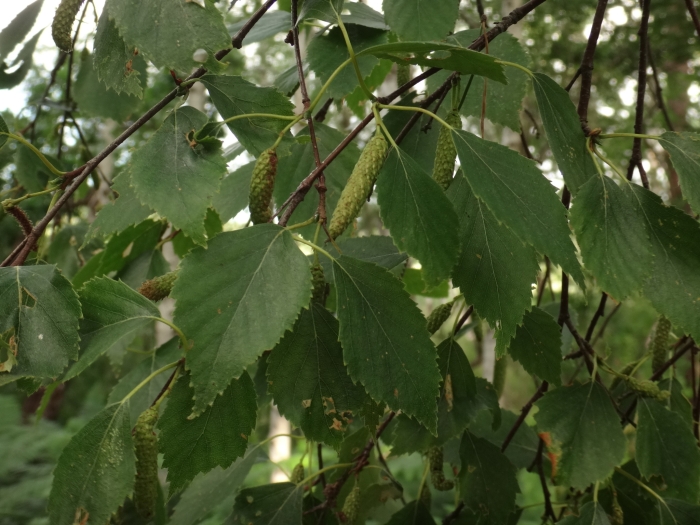Downy Birch
(Betula pubescens)
Downy Birch (Betula pubescens)
/
/

Christian Berg
CC BY 4.0
Image By:
Christian Berg
Recorded By:
Copyright:
CC BY 4.0
Copyright Notice:
Photo by: Christian Berg | License Type: CC BY 4.0 | License URL: http://creativecommons.org/licenses/by/4.0/ | Rights Holder: Christian Berg | Publisher: iNaturalist | Date Created: 2020-07-07T06:31:27-07:00 |


























































Estimated Native Range
Summary
Betula pubescens, commonly known as Downy Birch, is a deciduous tree native to a wide range of habitats including wet woodlands, moorlands, and on the edges of lakes and rivers throughout Europe and into parts of Asia. It is also found in Iceland and the Faroe Islands. This species adapts well to cold climates and is often one of the first trees to colonize open ground. The Downy Birch can grow to 10 to 20 meters (33 to 66 feet) tall, rarely reaching up to 27 meters, with a slender, often airy crown and a trunk up to 70 cm (28 inches) in diameter. The bark is characteristically white and peels in fine horizontal strips. Its flowers are wind-pollinated catkins produced in early spring before the leaves emerge. The fruit is a pendulous, cylindrical aggregate that releases individual winged seeds when mature.
The Downy Birch is valued for its ability to thrive in poor soils and its use in reforestation projects. Its light canopy allows for the growth of a variety of understory plants, making it beneficial for increasing biodiversity. In gardens, it is often used for its attractive bark and graceful form. It is also planted for wetland restoration and erosion control due to its extensive root system. This tree prefers full sun but can tolerate partial shade and requires medium amounts of water. It is adaptable to a range of soil types, including those with slow, medium, or fast drainage. While generally pest-free, it can be susceptible to birch leafminer and bronze birch borer.CC BY-SA 4.0
The Downy Birch is valued for its ability to thrive in poor soils and its use in reforestation projects. Its light canopy allows for the growth of a variety of understory plants, making it beneficial for increasing biodiversity. In gardens, it is often used for its attractive bark and graceful form. It is also planted for wetland restoration and erosion control due to its extensive root system. This tree prefers full sun but can tolerate partial shade and requires medium amounts of water. It is adaptable to a range of soil types, including those with slow, medium, or fast drainage. While generally pest-free, it can be susceptible to birch leafminer and bronze birch borer.CC BY-SA 4.0
Plant Description
- Plant Type: Tree
- Height: 40-50 feet
- Width: 35-50 feet
- Growth Rate: Moderate
- Flower Color: N/A
- Flowering Season: Spring
- Leaf Retention: Deciduous
Growth Requirements
- Sun: Full Sun, Part Shade
- Water: Medium
- Drainage: Slow, Medium, Fast
Common Uses
Bird Garden, Butterfly Garden, Deer Resistant, Fragrant, Rabbit Resistant, Salt Tolerant, Water Garden
Natural Habitat
Wet woodlands, moorlands, and lakeside edges throughout Europe, parts of Asia, Iceland, and the Faroe Islands
Other Names
Common Names: Moor Birch, European White Birch, Hairy Birch, Moorbirke, Moor-Birke, Bouleau Pubescent, Betulla Pubescente, Zachte Berk, Glasbjörk
Scientific Names: , Betula pubescens, Betula alba subsp. alba, Betula alba subsp. pubescens, Betula pubescens var. typica, Betula murithii, Betula alba f. pubescens, Betula alba subsp. frutescens, Betula alba var. pubescens, Betula ordorata var. pubescens
GBIF Accepted Name: Betula pubescens Ehrh.